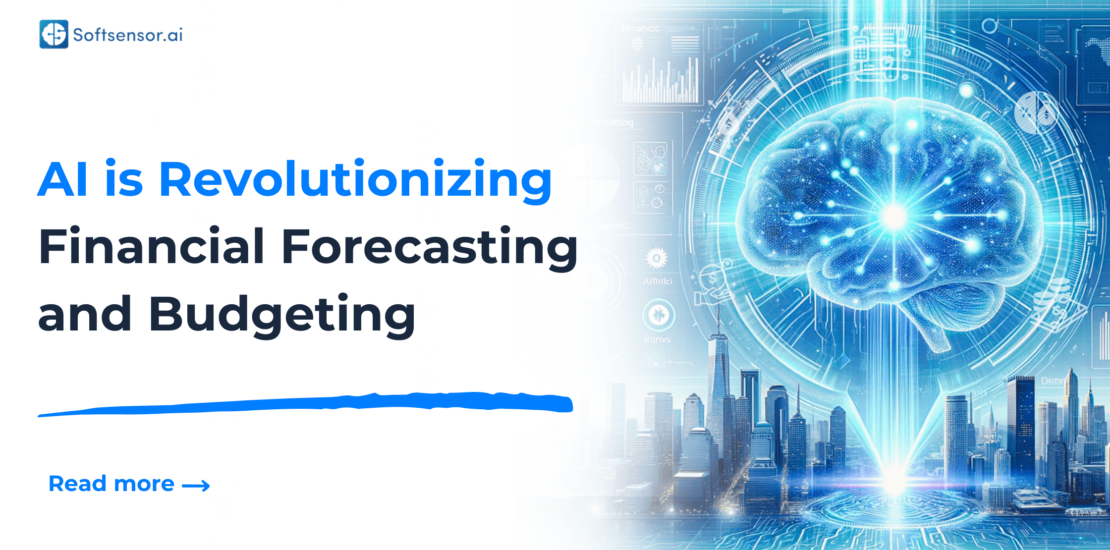- January 17, 2024
- Posted by: Softsensor
- Category: Uncategorized

5 Ways AI is Revolutionizing Financial Forecasting and Budgeting
In today’s dynamic financial landscape, organizations are on a relentless quest to enhance their financial forecasting and budgeting processes. Traditional methods, characterized by manual workflows and error-prone data handling, are becoming obsolete in the era of data-driven decision-making. Enter Artificial Intelligence (AI), a transformative force revolutionizing financial planning. In this blog, we’ll uncover the challenges associated with traditional methods and explore how AI is reshaping financial forecasting and budgeting.
Challenges of Traditional Financial Forecasting and Budgeting
Before we embark on the AI revolution, it’s crucial to grasp the limitations of traditional financial forecasting and budgeting methods:
- Excel Limitations: While Excel remains a valuable tool, over-reliance on it for heavy data management can lead to discrepancies and potential security risks in modern organizational contexts.
- Data Silos: Data is frequently scattered across various departments, making consolidation and effective analysis a daunting task. The lack of data integration hampers comprehensive financial planning.
- Lack of Real-Time Insights: Traditional methods primarily provide historical data, lacking the real-time insights necessary for proactive decision-making. In today’s rapidly evolving business environment, this lag in data can be detrimental.
- Limited Scalability: As organizations grow, traditional methods struggle to handle increasing data volumes and complexity. This scalability issue hampers flexibility and adaptability.
- Inefficient Scenario Planning: Preparing for various scenarios and contingencies is cumbersome and often inadequate with traditional approaches. This leaves organizations ill-prepared for unexpected changes.
Five Ways AI is Revolutionizing Financial Forecasting and Budgeting
Let’s explore how AI addresses these challenges and transforms financial forecasting and budgeting:
- Enhanced Accuracy:
AI’s most significant advantage is its ability to enhance accuracy. Unlike manual methods susceptible to human errors and biases, AI-driven forecasts rely on robust statistical models. AI analyzes vast datasets and recognizes complex patterns, resulting in more reliable financial planning. This newfound accuracy allows organizations to make critical financial decisions with confidence, reducing the risk of costly mistakes and enhancing overall financial stability.
- Real-Time Insights:
Timeliness is crucial in finance, and AI excels in providing real-time insights. While traditional methods rely on historical data and manual processes, AI continuously processes and analyzes incoming data streams. This offers instantaneous insights into financial trends and developments, empowering organizations to make data-driven decisions promptly, a game-changer.
- Efficient Scenario Analysis:
AI streamlines scenario analysis, a crucial aspect of financial planning. With its computational power, AI can effortlessly generate and assess multiple scenarios simultaneously. Organizations can model a range of economic conditions, from best-case to worst-case, and everything in between. This newfound efficiency in scenario planning enables organizations to be well-prepared for economic downturns, market fluctuations, or unexpected disruptions. AI’s scenario analysis helps develop robust contingency plans and make informed decisions that factor in various potential outcomes.
- Cost Optimization:
Cost optimization is paramount in today’s competitive landscape. AI excels in identifying cost-saving opportunities that might otherwise remain hidden. By analyzing historical financial data, expense patterns, and market conditions, AI systems pinpoint areas for cost reduction. For instance, AI may identify inefficiencies in supply chain management, suggest optimization strategies, or highlight opportunities for vendor negotiation. Improved cost optimization not only boosts profitability but also enhances financial resilience during economic uncertainties.
- Strategic Planning:
AI-generated insights free up finance professionals from routine data processing, allowing them to focus on strategic planning. AI provides accurate forecasts, real-time insights, and scenario analysis, supporting strategic thinking. Organizations can align their financial strategies with broader business objectives, ensuring long-term financial sustainability. This strategic vision is essential for thriving in a dynamic and ever-changing financial landscape.
